Blog
Blog
Damon Vignale on Showrunning and The Murders
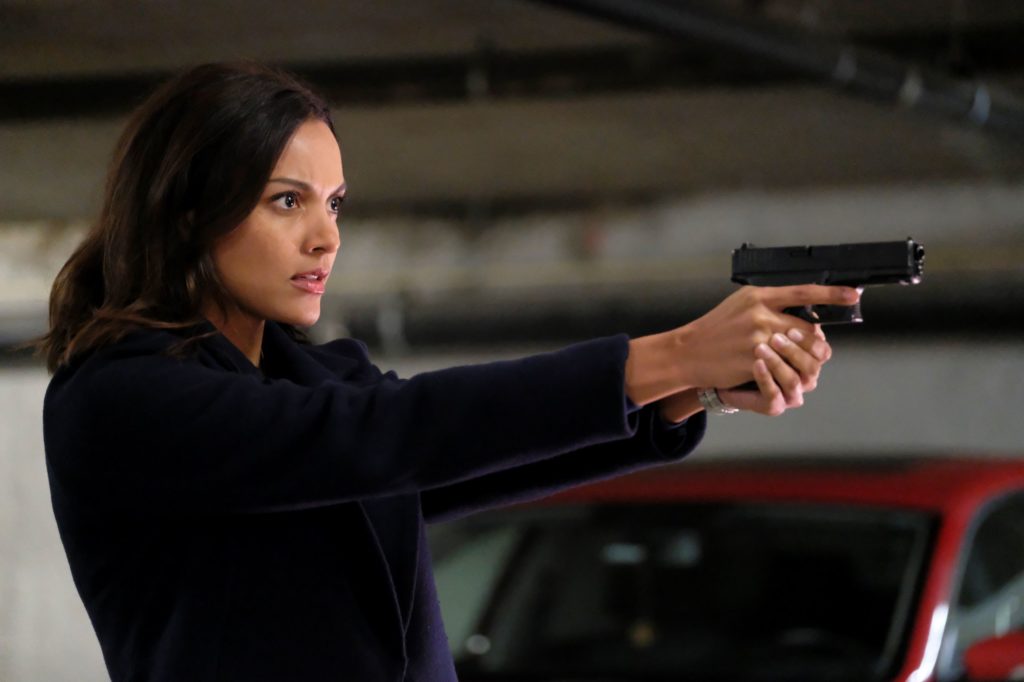
Jessica Lucas as Kate Jameson in The Murders
Damon Vignale dropped in for lunch at the PSP last week. Damon is the creator and showrunner of the original crime-drama series, The Murders debuting on March 25, 2019. He was also a writer and consulting producer for The Bletchley Circle: San Francisco, and writer and co-executive producer for Ghost Wars.
How did you break in to writing for television?
It was kind of a happy accident. I started out writing and directing independent features. On my first film I worked with a producer, Ron Scott, who many years later asked me to give notes on a comedy series he was producing, Mixed Blessings. He liked my input and assigned me three scripts. Ron showed me a pilot he was also working on, called Blackstone, and I knew immediately it was something I wanted to be a part of. When the show was greenlit to series, he hired me as a writer-producer.
You’ve just finished working on The Murders. It was your first time as a Showrunner. Can you tell us about that transition?
It was a big transition. Being responsible for everything and everyone is very different from being there solely as a writer. Handling the writing and production, you learn quickly to delegate.
Because I came up making independent film, and I also worked for numerous years as an Assistant Director on commercials, I understand production. I think that really helped.
The writing room is where I always feel the pressure because it’s where the story starts. If the work isn’t good there, it’s hard to turn it into something great farther down the line.
How did you coach writers to get the work done when you couldn’t be there?
Having a clear vision of the show you’re making is important. I’m also open with broadcasters’ notes, so we’re all on the same page. I relied on my writer-Co-EP, Karen Hill to oversee the writing team when I couldn’t. We worked together on Motive and she’s an amazing writer. She had been involved since development and her input was invaluable. I felt confident in her ability to drive the scripts forward and stay true to the tone and sensibilities of what I wanted the show to be.
What did you look for when putting your room together for The Murders?
I wanted to put a room together that had different voices. I didn’t want to create a space where we just pat each other on the back. Of course everybody in the room needs to be respectful, and buy into what the show is. That said, I try to bring people in with different points of view, different backgrounds, and different interests. I think we managed to do that with The Murders. It meant that within our crime drama, we were able to go after some really interesting stories and tackle some contemporary issues.
It doesn’t matter what room you’re in; there’s always that feeling of, “Wait, how do we do this, again?” You start with a blank page and it’s daunting knowing you have to turn out a season of television. For me, everyone’s voice is equal and the best idea wins. Writers come in with good and not so good ideas, and they all count. It shakes things up and starts a conversation that often takes you somewhere you never thought you’d end up.
Do you have any advice for TV writers trying to break in?
If you don’t have experience, then your original spec material really matters. Also, if I get a recommendation from a more senior writer, that’s going to carry some weight. At some point you are going to need someone championing you. If you have an agent, that’s great, but I think developing relationships with other writers and producers is helpful too.
Send Your Darlings Out Into the Cold (Read)

Photo by Jason Blackeye on Unsplash
There is nothing as exciting, or as crushingly revealing, as handing over your script to a group of actors for a cold read. How thrilling! Your characters will come to life and you will cringe at some of the lines you thought you loved.
You may fight to urge to grab the script back when you realize how many extra words you’ve given your quirky love interest. You may…have…to…sit…and…suffer… while the actor heroically plows through what’s written on the page long after the scene has deflated around …your…your…typos and your very robustly magnificent usage of adverbs. (See what I did there?)
Perhaps you already read your work out loud when proofing in your pyjamas. Just don’t fool yourself into thinking that your solo read-aloud will catch as many issues as a read by people who aren’t familiar with the material. If, like me, you’re used to finding your typos immediately after hitting “send,” then you probably already mistrust yourself enough to recognize this wisdom.
Kim Garland wrote a great article explaining how to host a table read for Script Magazine. I would add that this exercise can be useful even in the very early “vomit draft” stages of a project. I’m lucky enough to have a screenwriting group that meets regularly to table read from our works in progress. The notes that I make on my script while listening to these reads are invaluable. I’m pretty sure it saves me future pain, and it’s also a lot of fun.
Q&A With Showrunner, Larry Raskin
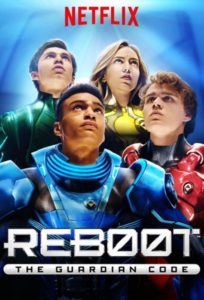
We were lucky to have Showrunner Larry Raskin join us for a lunchtime Q&A this week! Larry’s credits include Executive Producer of Reboot: The Guardian Code, Series Producer for Yukon Gold, and Director/Story Editor for Ice Pilots NWT.
On ReBoot, you hired writers who didn’t necessarily have experience writing for animation or for kids. What were you looking for?
On that show, I had a nice balance of serialized drama writers and comedy writers, including in the kids’ space. I hadn’t worked with any of the writers before, but it worked out. The main criteria for me is always a sensibility match. Being in a room is intense and very constant. You need to be able to share a sensibility for shows with a specific theme and approach. It accelerates the process. I’m also open to a voice that, if not a sensibility match, is complimentary.
How did you get into writing for TV?
I never thought of doing anything else, which is foolish! I did an undergrad in communications at Concordia and took a lot of writing courses as electives. Then I started working in the industry in Montreal, getting entry-level jobs. I got work on a six-show co-production with an Ontario company and a Quebec company. I went from being the producer’s assistant, to being the story editor on set. It was a fully immersive experience, working with the writers, the cast, and with the directors. After that, my wife and I moved to Toronto. I got a job with Atlantis Films doing development and story editing. That’s when I got the opportunity to start producing series.
When I moved to BC, there were fewer opportunities for scripted television, so I moved into factual television. I did ten years of cool factual shows and then finally got back into scripted with Reboot: Guardian Code.
How is story shaped in factual TV, as opposed to scripted TV?
Factual TV uses similar storytelling skills but you’re working with what you have, as opposed to what you want. The story process works backwards. You aren’t preconceiving the story lines.
In the shows I did, we followed professionals doing their jobs. Ice pilots was set in Yellowknife, and Yukon Gold followed miners in the Yukon. Real people were doing real things. The way those shows are shaped is through discussion with the main subjects, (what are their goals, what is likely to happen,) and then being extremely nimble and responsive to what does happen. A story takes shape in the moment, often through circumstance that was not foreseen. Your crew and your story team are always trying to figure out the potential of a story, and what elements are needed to make it a great story. It happens in the moment, and then it happens again once you recover that footage, review, analyze, ask for pick-ups, and start to shape it in the story editing and writing phase. Often you use interviews to fill in gaps that you don’t have footage for, but also to provide an insight that makes it more personal. If you ever get the chance to work as a story editor in factual, it’s an amazing opportunity to hone your story muscles and your editing skills.
Do you have any advice when it comes to working with agents?
Look for an agent who gets you, and who you think would give you the extra leg up that you need. What they’re looking for is something that makes you different from everyone else on their roster. When you’re talking with agents, you need to know your brand.
Do you have any advice for writers new to being in a room?
Not contributing is dangerous because it raises the stakes to be brilliant when you finally do speak. That said, you don’t want to dominate. Like in acting, listening in a writers’ room is crucial. Like musicians, you need to understand what track is being played, and not throw in ideas for another track at that time. It’s like jazz riffing. All the instruments need to play together and support each other. Tune in to what is going on. What you bring, in terms of positive energy, will almost always be returned to you.
Do you have any advice for newer writers handing in drafts to their showrunner?
On your own projects, you have the luxury of continually changing your script until you feel it’s the best it can be. Writing for someone else’s show is really about servicing their needs and the show’s needs. It’s a different skillset. If the outline is strong, focus on delivering in terms of structure. That way, if you even get halfway there in terms of character and dialogue, you’re giving the story department something very useful to work with. If you deviate from the outline and come in with a bunch of new ideas, it could be brilliant but often there’s no time for that. Check in with your showrunner about your ideas, but I would say no showrunner wants big surprises when you hand in your draft.
The Horrible Woman Who Helped My Screenplay
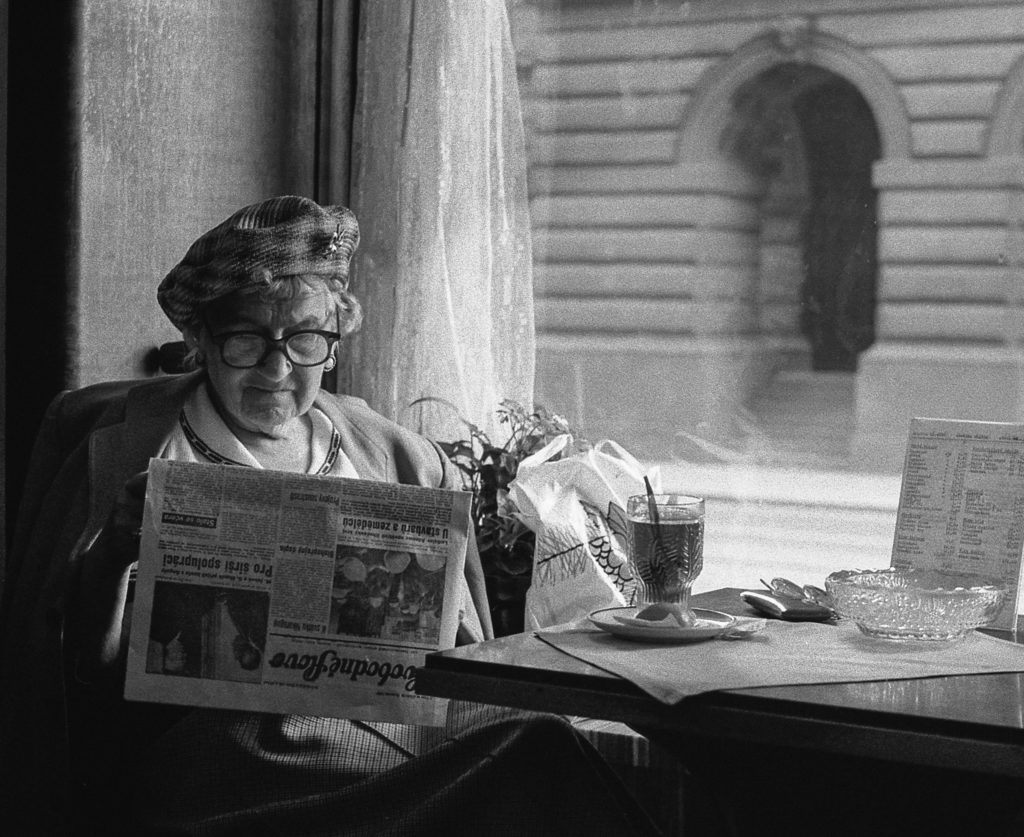
Photo by Anders Nord on Unsplash
A stocky woman in her seventies, her hair as royally permed as the Queen’s, sits at a four-person table by herself. Her brown wool jacket has a seat of its own. Her cane is draped against the table leg at an angle in an effort to trip innocent passersby. I have already decided that she’s horrible. Is that nasty of me? More importantly, is my character description effective?
This woman, let’s call her DOREEN, has been shouting into her cell phone for forty minutes. We are all glaring at her. She hasn’t noticed. She’s too absorbed in her very important phone call with a friend. Let’s call the friend, FRAN. Doreen doesn’t think Fran needs to make too much food. No, Charles wasn’t there. Yes, she had a funny feeling about that, too.
A lipstick stained coffee lid, a bent paper cup, three crumpled napkins, and a ball of banana bread cling-wrap lie scattered across her table. On the remaining chairs, she claims territory with a lumpy plastic shopping bag, a dripping umbrella, and her oversized beige purse. I’ve seen mothers with toddler triplets dine more discreetly.
For those of us lucky enough to be sharing our precious time with Doreen, it’s quite clear that she’s a “space taker-upper,” and probably a taker in general.
I should thank coffee shop Doreen, whoever she really is, for giving me a real-life negative impression that I can put to effective use in my writing. There’s nothing like people watching when it comes to figuring out how to show rather than tell. As John August explains in his fantastic blog post, How To Introduce Character, “Look for details that have an iceberg quality: only a little bit sticks above the surface, but it represents a huge mass of character information.”
How have strangers in public spaces influenced your scripts? I’d love to hear about it.
Q&A With Writer and Producer, Matt Venables
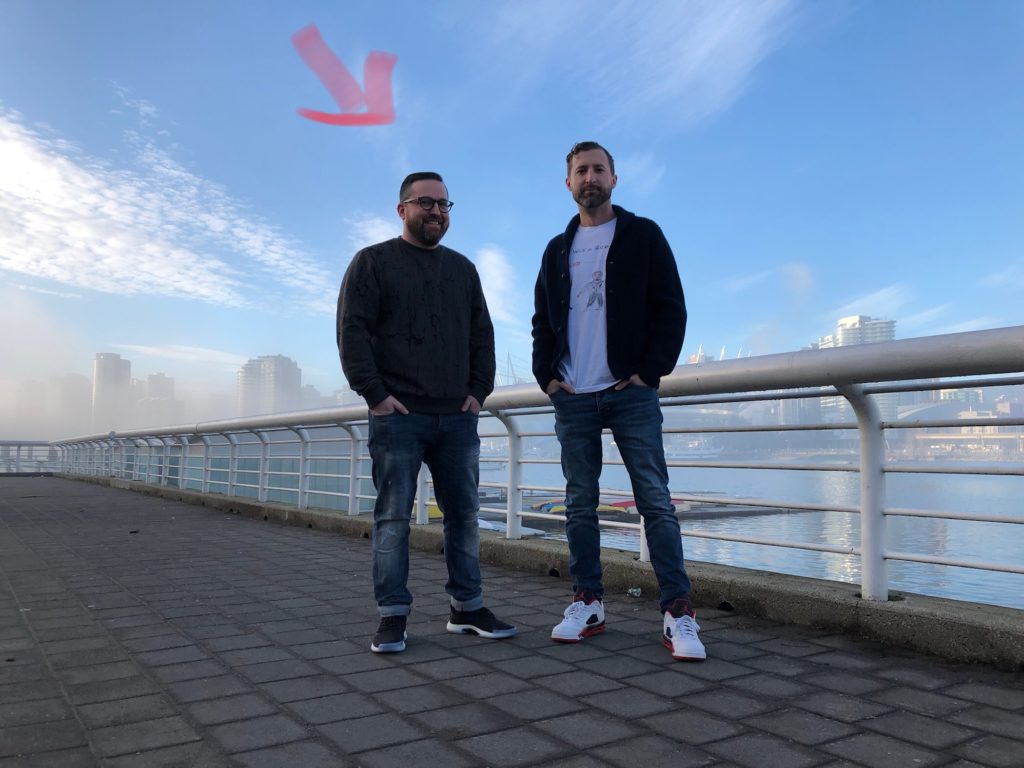
Vancouver Based Writing Team, Matt Venables and Jeremy Smith
Matt Venables took a break from prepping Van Helsing season 4 last week to join the Scripted Series Lab for lunch. We were very eager to ply him with questions, as well as mac and cheese!
You work as part of a writing team with Jeremy Smith. What are the pros and cons of working as a team?
The cons? You split the money. We’re not greedy guys so it’s not really a con for us. The pros? It’s a mini writers’ room! We’ve always got each other to bounce ideas off with. We’re always pushing each other, building off each other. Being in a team taught us a lot about being in a writers’ room before we were really in a room because we learned not to be precious about everything we write. Be passionate, but not precious.
How do you and Jeremy complement each other as writers?
We joke that I build the foundation and then he finishes the house. I put in a lot of the structure. He almost always does the final pass. Apple TV changed the way we wrote because now we can put a script on a screen now and go through it together, screen by screen, line by line. If there’s something one of us wants to change, we highlight it.
How do you get your voices to match throughout a script?
Again, Apple TV! We go through the script together. Also, the final pass, which is usually Jeremy, ensures that voice issues get smoothed out. He sends it to me after the final pass, and if there’s something I want to adjust, we can do that. We don’t like to use email for this because that can get in the way of the communication.
What are some of the struggles you two have had together with ego?
We haven’t really had ego issues. Sometimes one of us will be really into an idea and the other person just isn’t feeling it. I pitched Jeremy an idea for a comedy and he didn’t want to do it. I think I wasn’t doing a good job of explaining it. I finally just wrote a draft so he could read it, and then he was like, “oh yeah!” and he got into it.
How do you guys sort out doing a pitch?
I’ll start with the back story of why the project is important to us, then he’ll take the lead from there. Jeremy likes to talk more than I do. I’ll interject once and a while.
Do you have any advice for those first early days in a writers’ room?
If you can get in as a writer, awesome, do it. I’m big on doing script coordinating first though. I think it teaches you a lot about the job, and what it takes to be a story editor and the whole script process for production. It’s a lot of work. If you don’t know what a script coordinator does and you’re a story editor, you’re probably leaning on the coordinator too much. It’s invaluable to have done that job.
Also, I would say be persistent. It’s a long road. For us, it took twelve to fifteen years. Rooms in Vancouver were so rare, and we were also finding our voice. We were lucky, and we were prepared when we got the opportunity.
Everything you learn, in any position, that helps you understand how the machine works, is going to be useful. We both worked as office PA’s. I’ve worked as a locations PA, I’ve collected garbage on set…to me it’s all relevant knowledge. You’re better for it in the long run if you know how the machine works because you can catch problems before they fall through the cracks. As a showrunner, that’s invaluable. The little things add up, so fix everything in prep. For that, you need to know how it all works.
What’s Your Advice for Getting yourself on the list of script coordinators who get an interview?
Ink drinks is a good place to meet other writers. It’s a great community. Get a job in the industry however you can, then start making those connections. I got my first opportunity as a script coordinator because a producer I had worked for, (as a Producer’s Assistant,) knew I wanted to be a writer. She gave me the heads up about a room that would be starting up, and that got me an interview.
It’s about putting yourself out there and making connections.
Now that you and Jeremy are developing more of your own stuff, what’s your process for developing new material?
It’s pretty much the same as in any writers’ room. We do a lot of talking, and we have corkboards in our houses. We card everything.
What’s your advice for creating good pitch material?
I would google “successful pitch document.” Try to show the tone of the show. Have a firm understanding of your characters. Be concise in what your story is. It’s hard, so be passionate about your material! Also, you’re selling yourself as much as you’re selling the project.
Q&A With TV Writer Gemma Holdway

This week our Scripted Series Lab participants welcomed writer, Gemma Holdway, to one of our “order lunch and then ask so many questions that she has no time to eat,” sessions. Gemma’s credits include consulting producer on The Murders, story editor on Ghost Wars, and Cardinal, as well as script coordinator on Gracepoint, and High Moon.
How did you make the transition from film school to being a working writer?
I started writing TV movies on spec and meeting with MOW (Movie of the Week) producers, and had some success with that. Generally, they don’t care if you have credits. They just want a script.
At the same time, I was trying to get into scripted TV. I got my first job on an American show, High Moon, as a producers’ assistant, clearances coordinator, and script coordinator. It was a lot to take on, but I made some good connections doing that job. I had to learn how to script coordinate on the fly, but it led to other script coordinating gigs. While doing that, I always made sure that people knew I was a writer, and that I had samples.
I find that when you do script coordinating again and again, people want you to stay in that role because you’ve proven yourself as an asset in that capacity. Eventually, I found I had to speak up and ask for a story editor credit as well. So, on Ghost Wars I was script coordinating but I was also a story editor. I pitched ideas but I was also taking notes, preparing script for production and I wrote an outline on that show, so I got a “story by” credit.
After that experience, I decided not to take any more script coordinating work and was able to transition to just being a writer.
I’ve heard some people say, in Canada, they expect people to do three full seasons of script coordinating before they’ll consider moving you up. I script coordinated on full seasons, pilots, MOWs and features. But script coordinating for features or TV movies won’t advance your TV writing career.
What was the transition to going in as a story editor like for you?
For a long time, as a script coordinator, I had to read the room. Some people don’t want you to participate much at all and others do. Even in rooms that were less open to my participation, I would keep pitching to some degree, but cautiously.
In some larger rooms, you may get the message from the top that everyone can participate, the best idea wins but you might get sideways looks from mid-level or junior writers. I had to decide, “Am I going to please everyone at the table, or am I going to focus on pleasing the showrunner?” That can be a constant struggle. I do think you need to be mindful of the hierarchy in the room. Give space to the senior writers, try not to interrupt, and find the right moments when it’s safe and a good idea to pitch.
When I moved into being purely a story editor, the next challenge was stepping up to the plate. There are different pressures on you. I’m naturally a bit shy, so I was nervous about putting myself out there. With help from showrunners like Damon Vignale, I learned I had to just pitch every idea. Sometimes it was really embarrassing, but in the long run, it’s worth it even if you’re going to make a fool of yourself. You’re paid to come in and pitch those ideas. A lot of people want that job, so you need to prove your worth. It’s scary but it can also be a lot of fun.
Larger rooms can be very political. You might have a few people doing most of the talking, but you can often expand on/add to someone’s pitch. You don’t want to just tear other people’s ideas down unless you have a good alternative.
How many spec samples did you have when you went looking for an agent?
I think my agent was willing to invest in me because of my script coordinating experience. Often that’s a good way into a story editing job.
I had four pilots. My interests are broad, so they were all across the board, genre-wise, all one-hour dramas though. Now I also have a half-hour dramedy that I wrote last year.
When you get an agent, you still need to hustle. You can’t just rely on the agent to get you work. They’re submitting your work, setting up meetings for you and negotiating your contracts but I also set up meetings for myself.
What’s the usual ladder of seniority in a room?
You start as maybe a writers’ assistant and/or script coordinator. Then you’re a story editor, then an executive story editor.
Often, it’s useful to look at producer credits to understand the hierarchy in the room. Going up the ladder there might be a consulting producer, co-producer, producer, supervising producer. It gets confusing, but those are middle of the pack.
The “second” in the room is often a co-executive producer. Your showrunner is an executive producer.
How, when and where do you like to do your writing?
That’s a good question. I have a red couch and I like to sit there and write, but if I’m on a tight deadline, I’ll move around a lot. I use the Pomodoro Technique, where I write for twenty-five minutes, and then take a break, and then write again.
Do you write chronologically?
I do, but I need to stop doing that! You should write the scene that you’re most excited to write in that moment.
Can You Spot the Screenwriters?

Mike Orlando is a convert to the time-tested index card method of breaking a show. “It looks like chaos, but it’s actually really handy,” he says. “It’s especially useful when you find yourself changing something in one episode, and then you have to sort through and adjust scenes in other episodes.”
Scott Meyers, @GoIntoTheStory, has a good description of the index card method here, on the official screenwriting blog of The Blacklist.
What other screenwriting wisdom is being shared? Now that we are well and truly into the swing of the Scripted Series Lab, I asked Petie Chalifoux and Mike Holland how the reality of the program differed from their expectations.
Petie says she came from a short film and feature writing background. Knowing how little she knew about the world of TV writing, she says she arrived with a very open mind and few expectations. After several weeks of story room immersion, Petie is happy to report that she has much more perspective, and a better knowledge of this side of our industry.
Mike is impressed by the intense pace and workload required of participants. As he puts it, “It’s a good thing this is what I love to do.”
Lunch with Van Helsing writer and producer, Jeremy Smith

TV Writer and Producer, Jeremy Smith, joined us for lunch last week, despite being in the thick of prepping for Van Helsing season 4. We were all impressed with Jeremy’s productivity and the volume of work he manages to juggle so successfully. Jeremy’s advice for aspiring TV writers is to be a positive person in the room, and to foster those business relationships. As he puts it, “It’s not just how good you are at creating story. Relationships are a big part of it.” You need to be someone people want to be in the same room with for months at a time.
Thank you, Jeremy!
Daegan Fryklind Visits the Scripted Series Lab
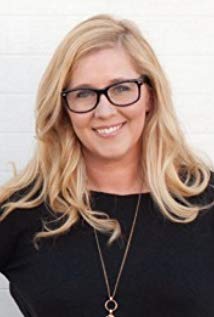 We’d like to thank writer and producer, Daegan Fryklind, for meeting up with the Scripted Story Lab writers over lunch this week.
We’d like to thank writer and producer, Daegan Fryklind, for meeting up with the Scripted Story Lab writers over lunch this week.
The salads were way better than your average “platter of sandwiches,” but more importantly, we enjoyed hearing all that Daegan had to share about her experience working in both Canada and the States.
Along with entertaining anecdotes and some reassuring wisdom on the art of pitching, Daegan advised us to get to know our local screenwriting peers. As she puts it, we all have different strengths that can fit together in different ways in the room. It’s a small, tight, supportive community.
Thanks, Daegan!
Thank you Rob
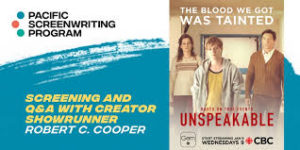
Thank You to Showrunner and Executive Producer, Robert C Cooper.
We would like to send a big thank you to Rob for his Q&A event. It was a sold-out show! Rob’s generous discussion on the nuts and bolts of creating a show based on historical events was informative to all the writers in the room.
Rob recently completed writing and producing Unspeakable, a limited series based on the Canadian Tainted Blood Tragedy, now airing on CBC. Previously, he served as showrunner on Dirk Gently’s Holistic Detective Agency for BBC America, Netflix, and AMC Studio. Rob is well known for his work as showrunner for the Stargate television franchise.
When one audience member asked Rob how his first-ever pitch went, Rob admitted that he wasn’t sure he remembered his very first pitch. He did recall his initial pitch to Stargate, early in his career. It mostly fell flat. It was only when he had exhausted his prepared material and he tossed out a few scraps of story ideas on a last desperate whim, that the show’s creator finally picked up his notepad and took an interest. The rest is history, so always give it everything you’ve got!
Thank you, Rob.
Give Your Writing Routine A Boost Using The Five Senses

Photo by Emily Bauman on Unsplash
It’s a big deal just to protect your writing hours, and once you sit yourself down, there’s the little matter of getting your mind to focus on the work. In his book, Deep Work: Rules for Focused Work In A Distracted World, Cal Newport, suggests that rituals reduce friction and save mental energy, allowing you to move more quickly into a state of deep concentration. Using a writing routine ritual incorporating all five senses is a great hack for strengthening the power of your work habit and your focusing muscles.
Are you writing on the same computer screen that you use for checking Facebook or surfing the web? This mixed-use visual habit sends the wrong message to your brain. Consider placing a small personal item attached to your writing goals within your field of vision. Have it out only when you sit down to work. When your eye wanders, let it wander to the thing that reminds you of your intention.
Have some sort of auditory cue on hand to begin each writing session the same way. A short guided meditation track can be useful, or a song that gets you fired up. After you’ve played this “starting” piece, you can tune in to your preferred writing soundtrack, or a white noise source, and drill down to work.
These senses are so interlinked that I’ve joined them together. Maybe there’s a brand of mint you could carry with you for work sessions only. You could start each writing block brewing the same tea. Try to find something special that you can associate only with writing, but not so specialized that you will only be able to work at the one coffee shop in town that carries your chosen “writing trigger” blend of fair-trade pineapple rooibos.
Do you have something tactile that could be used as a cue get your mind back to your story? The old lucky rabbit foot trope comes to mind, but even twisting a ring on your finger a certain number of times, or setting your palms over your closed eyes for a count of ten would do the trick. You get the idea. Decide on something subtle if you don’t want to weird out your table mates. Or maybe you want to unnerve your neighbours? It is nice having a table to yourself.